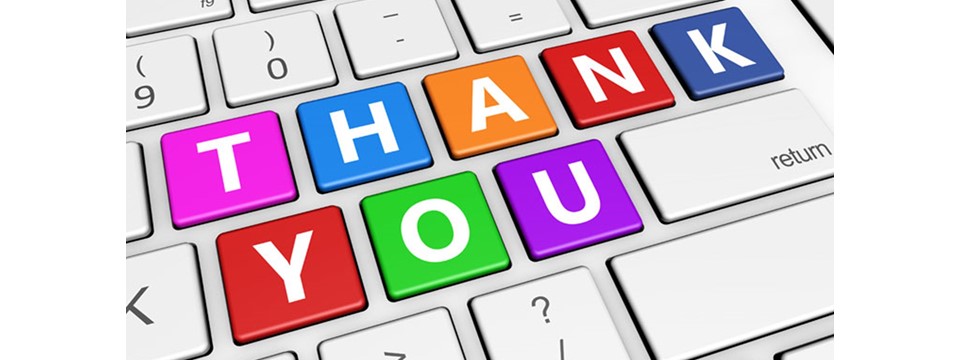
Thank you notes are powerful and necessary in a variety of professional situations. While everyone knows to write thank you notes after a job interviews, many other scenarios also warrant one, yet many people overlook this respectful show of appreciation and opportunity to make (or reinforce) a positive impression.
Regardless of how well you know someone, when that person helps you in some way (especially if their aid is unsolicited or unexpected), responding with gratitude is key to show that you value their time and don’t take your relationship for granted.
While this may sound like obvious business etiquette, in practice, it’s overlooked far too often. Much like a post-interview thank you email helps you stay top of mind with a hiring manager, writing a thank you note in other business scenarios is a simple and effective way to differentiate yourself as a respectful and appreciative person who follows best business practices.
Here are some not-to-miss opportunities to make great impressions with thoughtful and timely thank you notes:
Making and receiving introductions is a big part of strategic networking and relationship building. When you’re introduced to someone via email, regardless of the reason for connecting, always thank the person who facilitated the introduction (even if your new connection does so first).
A person who makes an introduction on your behalf effectively puts their reputation (and personal brand) on the line to arrange the connection. Regardless of their reason or motivation for facilitating a new relationship, they’re taking a personal risk for your potential gain -- don’t take it for granted! If the introduction leads to bigger results (e.g., vendor contract, job offer, board candidacy, speaking opportunity), it’s also imperative that you follow up again later and acknowledge the positive outcomes of the new connection.
Landing new customers or clients can be a critical part of professional success. If someone refers potential business to you, always thank the referral source. People are more likely to send business your way when they feel their efforts are appreciated. If the referral becomes a customer, send an additional note of thanks, signaling to the referrer that their instinct in making the connection (and understanding your business/target market) was correct. Neglecting to show gratitude to a referral source not only can impact your relationship with that person (or company), it can deter future introductions too.
If someone thought of you and how you might enjoy or benefit from attending an event, their gesture warrants a prompt reply and thanks -- even if you can’t make it. Depending on the type of event (especially if it’s a small, exclusive group), the invitation may have required vouching for you first, so it’s imperative to reply in a timely manner. The last thing you want is for the referring party to follow up with you to confirm that you received the invitation because you haven’t responded yet (or missed an RSVP deadline).
When someone takes time to speak with you and provide advice or guidance, follow up after with a brief thank you note. Particularly if you benefit from someone’s professional opinion, i.e., advice or expertise that they normally receive compensation for (like counsel from an attorney, PR consultant or therapist), a thank you is paramount.
A well-written message acknowledges that you’re grateful for the guidance itself and, very importantly, that you respect and value their time (which they gave you freely, but normally would monetize).
If you invite someone to be a speaker or panelist at an event you’re hosting or organizing, sending a timely thank you should be at the top of your post-event checklist. Not acknowledging a speaker’s time and contribution -- regardless of how long they spoke for, how far they traveled, if it was a voluntary or paid engagement etc. -- is an oversight. If a speaker feels unappreciated following an event, don’t be surprised if they hesitate to make referrals/introductions, recommend your organization or accept an invitation to speak at your future events as result.
If someone tells you about an opportunity, sends a link to a posting or passes on contact information for a hiring manager or recruiter running an active search, remember to thank them. Even if you’re not actively on the market or if the opportunity isn't the right fit, your network is always a critical part of a job or board search and a vital source for leads -- don’t burn any bridges by not recognizing someone’s effort on your behalf (even if unsolicited).
This is particularly important when your contacts know about opportunities before they’re posted and they share them with you. Recognize that they’re providing exclusive, coveted information, and communicate appreciation in return (even more so if the opportunity is spot-on).
While proofreading everything you write is a given, an occasional error or two may slip through. Depending on what it is, the impact may range from oops/not a big deal (e.g., typo in an email) to major embarrassment (e.g., glaring error in client presentation or missing word in LinkedIn headline). If someone alerts you to a mistake and saves you from wide exposure, saying thank you is a must.
Showing appreciation to someone who has done something to help you is a basic best practice in business (and in life in general), yet is somehow too often missed. Sending thank you notes is more than a simple courtesy -- it’s a crucial habit and important reflection of your personal brand. Communicating that you value and respect someone’s thoughtfulness and time -- and don't take their efforts for granted -- they’re more likely to hold you in higher regard and assist again in the future. A show of gratitude can also help build connections and strengthen relationships.
As Emily Post, the legendary etiquette expert once said, “To make a pleasant and friendly impression is not only good manners, but equally good business.”